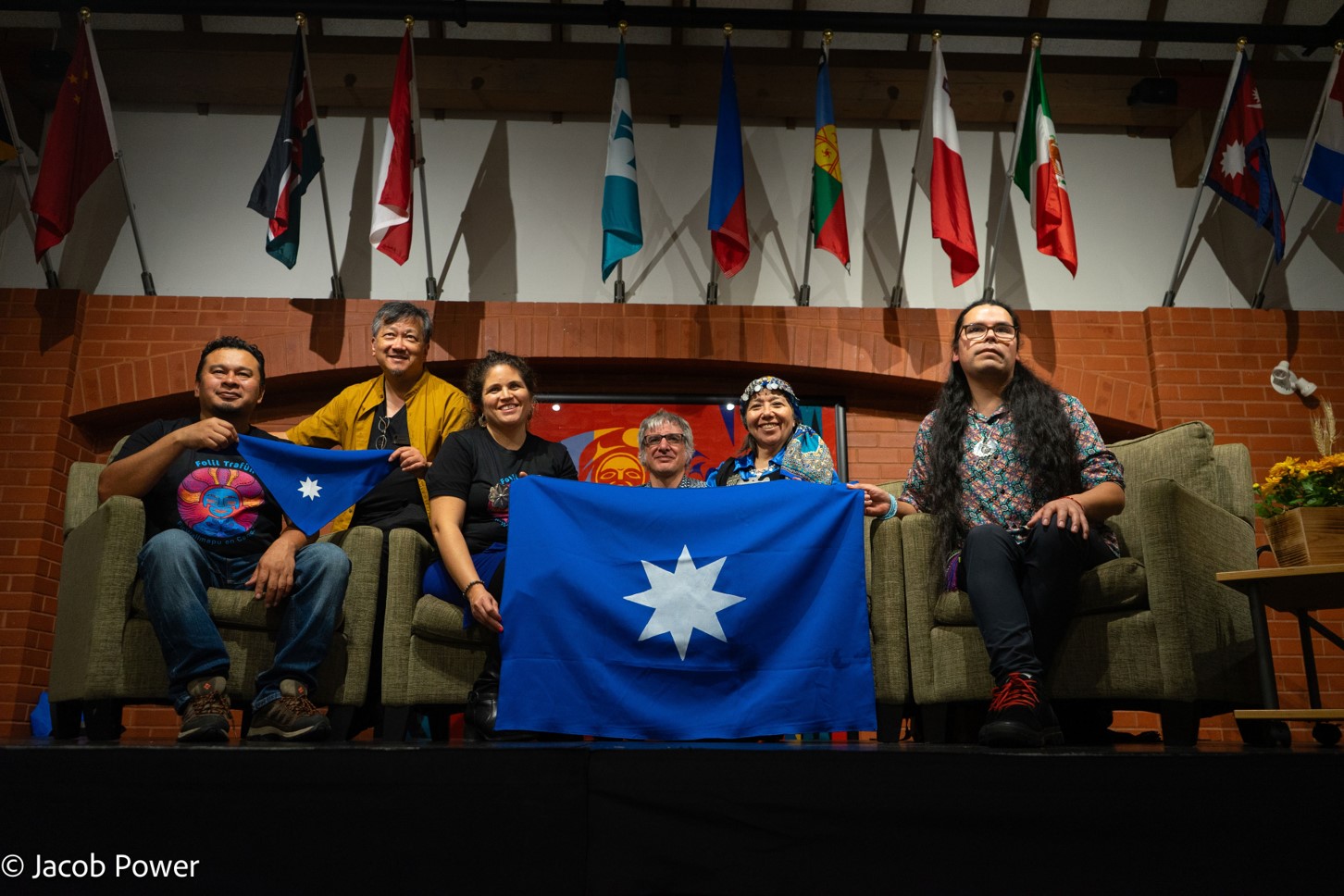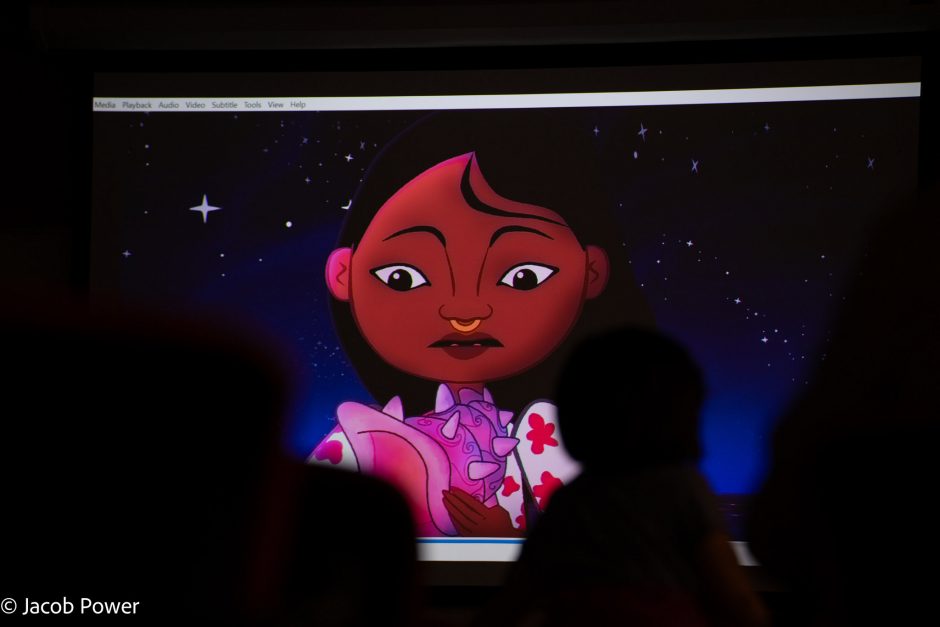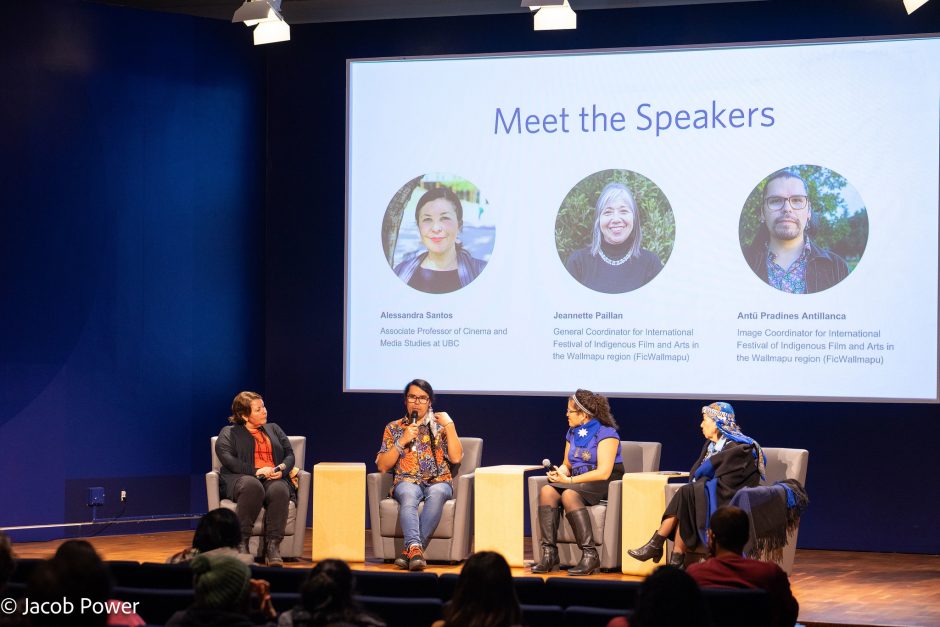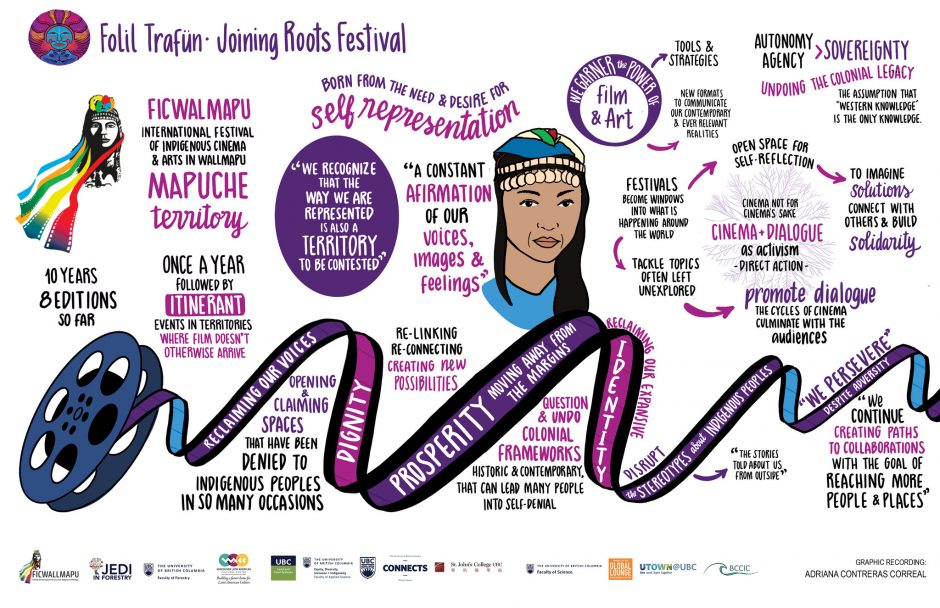
In the fall of 2023, the Vancouver Latin American Cultural Centre (VLACC), Ficwallmapu, and UBC’s Faculty of Forestry collaborated to highlight and celebrate Indigenous and Afro-diaspora films from Latin America, followed by dialogues to deepen understanding of the films and their relationship with local realities.
During the four days of the Folil Trafün festival, audiences had the opportunity to delve into several Indigenous and Afro-diaspora films from Latin America. At the main showcase of the festival, hosted at UBC Robson Square, attendees immersed themselves in feature-length, documentary, and short films including Folil (Feature film – 2020), Energía de los Pueblos (Documentary – 2020), Kapaemahu (Short – 2020), Tita, tejedoras de raíces (Short – 2018), Mama para (Short – 2020), Muu Palaa (Short – 2020), Trully (Short – 2016). Through these films, audience members gained exposure to stories, experiences, and knowledge historically underrepresented in academia.
In addition to film screenings, VLACC, Ficwallmapu, and UBC Forestry collaborated to organize panel discussions and Q&A sessions, providing a platform for audiences to listen to and learn from Afro-descendent, Indigenous, and Latinx voices, including Indigenous scholar and filmmaker Jeannette Paillan and Williche Indigenous visual artist and graphic designer Antü Pradines Antillanca. UBC professor of Cinema and Media Studies Dr. Alessandra Santos and UBC co-lead Dr. Hisham Zerrifi also spoke at the event.
When asked about the experience and impact of the project, VLACC Executive Director Lili Vieira de Carvalho expressed that, “The first edition of Folil Trafün was a fantastic opportunity to start a conversation about the Indigenous Experiences in the Americas, including the stories of colonization in Latin America and Canada. This fantastically curated event sparked curiosity, exposed diverse realities, and opened spaces for difficult but necessary conversations.” She went on to say, “At VLACC, we are proud to have contributed to the amplification of Indigenous voices through art. Co-presenting Folil Trafün aligns with VLACC’s commitment to promoting inclusivity, cultural awareness and pride and finding how we can contribute to a path to Reconciliation.”
“We are proud to have contributed to the amplification of Indigenous voices through art. Co-presenting Folil Trafün aligns with VLACC’s commitment to promoting inclusivity, cultural awareness and pride and finding how we can contribute to a path to Reconciliation.”
— Lili Vieira de Carvalho, Executive Director, Vancouver Latin American Cultural Centre
Through the festival’s activities, the project successfully transmitted ancestral knowledge, creating a forum to critically examine the roles of knowledge holders, and promote truth, reconciliation, and decolonization within academia and society at large.
See below for project details and a Q&A with project co-lead Dr. Hisham Zerriffi.
Project Details
Project Title: Folil Trafün: Connecting Through Indigenous Films from Latin America and Canada
Project co-leads:
- Thais Bouez, Programming Coordinator, The Vancouver Latin American Cultural Centre
- Dr. Hisham Zerriffi, Associate Professor and Associate Dean, Equity, Diversity and Inclusion, Department of Forest Resources Management, Faculty of Forestry
Project duration: September 2023 to October 2023
Learn more: https://forestry.ubc.ca/events/folil-trafun-joining-roots-festival/
This project was supported by UBC Connects at Robson Square and the Partnership Recognition and Exploration (PRE) Fund
Q&A with UBC co-lead Dr. Hisham Zerriffi
Why is this project important?
The importance of this project relies on the powerful tool of documentary film and less visualized genres (e.g., animation, fiction), to communicate stories and realities from Indigenous territories of Latin America. Additionally, we aimed to promote dialogue between the university community and members of the Afro-descendant, Indigenous and Latin American community residing in the Lower Mainland, in the shared territory they inhabit.
Audiences watched films that transmit ancestral ways of life and philosophies which remain current and have been traditionally veiled by hegemonic knowledge systems. This fulfills the priority of VLACC (co-applicant and community partner), Ficwallmapu (community partner), and Afro-descendant, Indigenous and Latin American communities in the Lower Mainland. Our objective for this showcase was to advance truth, reconciliation and decolonization of academia and the broader society, while also changing personal perspectives on these issues.

What strengths did each party bring to the project?
The Vancouver Latin American Cultural Centre (VLACC) provided invaluable resources such as volunteers and connections, and expertise especially with youth and BIPOC Latinx residing in Vancouver.
The UBC Faculty of Forestry contributed logistics, hosting, community connections to the academic community, especially BIPOC, and also provided communications support to the project.
During the project, what opportunities did participants have to teach, learn, or do research?
The goal of this project was to expand our understanding of teaching and learning and think critically about who possesses knowledge and is considered a teacher versus who is considered a learner. The project aimed to acknowledge the power of different knowledge systems and dismantle the hierarchy and power dynamics present in academia. Although the project was not designed to provide research opportunities, it had a transformative impact on several researchers who attended the events. Participants and organizers had opportunities to learn and teach during the panel discussions and Q&A sessions.

What was your favourite outcome or experience from the project?
Our favourite outcome from the project was that we were able to pilot an unprecedented mode of collaboration and co-development guided by four pillars:
Reciprocity, Territorial dialogues, Land back, and the Positioning of Indigenous Codes.
Moreover, we want to highlight the added value that some people brought to our project. Emilia Rojas, a multidisciplinary Andean artist and Early Childhood Educator, facilitated children’s activities in the Robson Showcase, including films and the presentation of her book ‘The Adventures of Nubit.’ Additionally, we were supported when reflecting on the Folil Trafün relations and insights on a knowledge wall (live graphic recording, see below) by Adriana Contreras, a gifted Colombian artist. Adriana’s graphics fostered dialogue and created conditions for sense-making, connection, accessibility, imagination, and visioning. We will be sharing two graphics in this report, which can be seen here. Last but not least, we are also grateful to Jacob Power and Paulo Ramos for their exceptional work as photographers for the events on the 26th and 28th, and for capturing the essence of the events with great sensitivity and quality.

Can you share a few lessons you learned during your project?
Early on, we learned that our partnership required us to adapt our timeline and that it would require more conversations, space and time to build trust and reciprocity. Right from the start, we committed to being transparent about our own approaches and ideas and have engaged in bilingual dialogue to address complex questions around our priorities, motivations and the agreed-upon need to have this project be a true collaboration and co-creation opportunity.
Additionally, establishing this partnership and writing this grant prompted us to discuss complex topics as well as to reflect on our own biases and preconceptions.